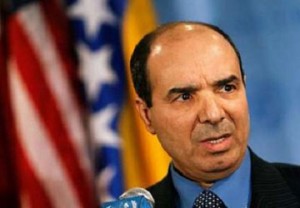Libya’s representative at the UN, Ibrahim Dabbashi, has criticised US President Barack Obama’s decision to extend the emergency period in Libya . . .[restrict]as “unrealistic”.
On Thursday, the US president sent a notice to Congress extending by a year the national emergency over Libya; the emergency was announced originally on 25 February, 2011.
In his letter President Obama stated: “The situation in Libya continues to pose an unusual and extraordinary threat to the national security and foreign policy of the United States and we need to protect against this threat and the diversion of assets or other abuse by certain members of Qaddafi’s family and other former regime officials.”
Dabbashi said that the current situation in Libya was under control and it would be impossible for Qaddafi’s family or his supporters to destabilize either the security of Libya or the US.

In his statement, the American leader also said: “We are working closely and diligently with the new Libyan government and the international community in order to reduce the restrictions imposed on the entities that were subject to sanctions. We want to take actions that are in line with the UN Security Council’s decision on December 16 pertaining to the removal of sanctions on Libya’s Central Bank and two other entities.”
Dabbashi emphasized in a telephone conversation with the Arab journalists on Thursday that American concerns that prompted the sanctions extension were made out of fear that Qaddafi’s sons or supporters might threaten the US’s security or interests. But it reflected an unawareness of the present local situation in Libya.
Dabbashi also said: “Despite the fact that the Libyan authorities are unable to exert complete control in all areas of the country, the Libyan people are aware of the seriousness of the situation and that the role of the military in Libya’s stability and security is very significant.”
He added: “I recently visited Libya and went to most of the large cities. I didn’t notice any threats or civil disturbances inside the country; however, there is some dissatisfaction with the government’s performance.”
Dabbashi also referred to what he called “the unclear vision of the current situation in Libya”, saying that “this unclear vision is not only linked to Americans but also to some Libyan officials who do not know how the Libyan people think because of their long absences from Libya”. He said that “their judgments have been made based on comparisons to situations in other countries”. [/restrict]










